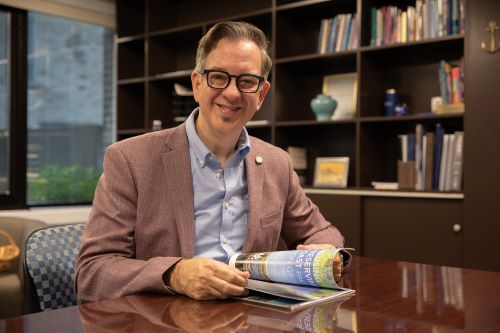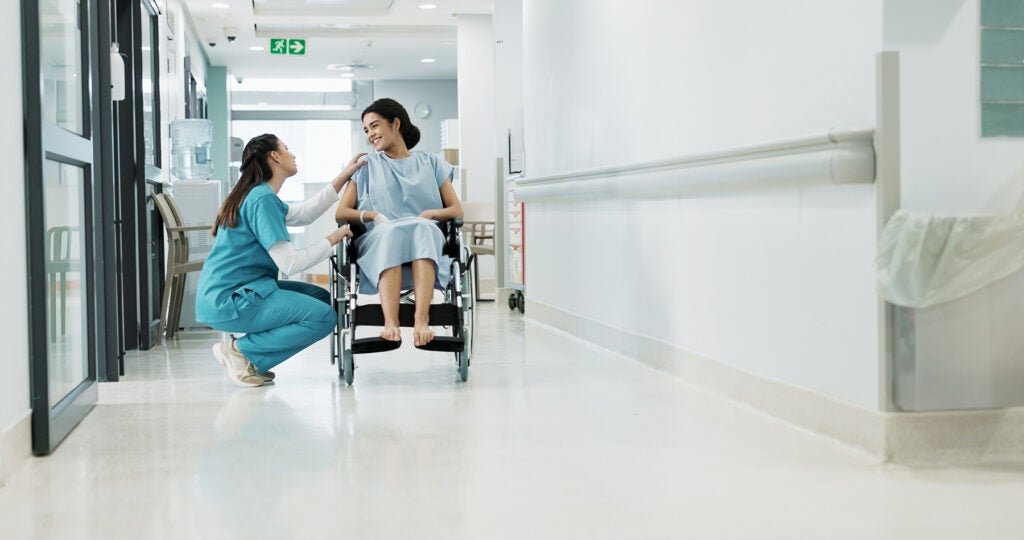Danny Willis, the newly appointed dean of the College of Nursing, brings with him a wealth of experience and a vision for advancing nursing education, research, and practice-based knowledge development at the University of Rhode Island (URI).

Dean, College of Nursing
“We nurses are collaborative, science-based, humanistic, caring, compassionate practitioners,” Willis says. “We combine knowledge of science and theory with the art of understanding pattern, being present, facilitating healing, and—a substantive knowledge base and skill set that no one else can really bring in quite the same way.”
Looking ahead, Willis envisions evolution in nursing inquiry and research funding, particularly from the National Institutes of Health (NIH) and other federal sources. He also advocates for state-of-the-art facilities for research faculty and collaborative workspaces, like innovation hubs and active learning classrooms for students.
Central to his vision for the college’s future is building a robust environment and infrastructure to support nursing research and teaching. He emphasizes the pivotal role nurses play in promoting health and wellbeing, alleviation of suffering, and disease prevention across various spheres of patient care, at the bedside, in the community and world, and in research settings.
Willis states, “I am deeply committed to promoting health equity and energized by the innovations we bring in transforming wellbeing and environments as nurses. I am enthusiastic about bringing URI’s internationally recognized nursing faculty to even greater heights.”
Recognizing nursing’s capacity to promote wellbeing, health equity and offer holistic care, Willis stresses the need to address health disparities, noting, “Nursing approaches situations from a biopsycho-social-environment means, and even steps beyond that to be more holistic.”
Willis emphasizes the need to understand the impact of the social determinants of health—essentially the nonmedical factors that contribute to a patient’s health outcomes, including the social and environmental conditions in which people are born, grow, work, and live.
“I would like to see us be a force for the promotion of human wellbeing—both for ourselves and for our planet,” stresses Willis. “And I would love for us to attract and draw in new faculty and students aligned with our mission, which we are already doing since I have arrived.”
He also understands the need for nurses in training to be prepared to face an ever-changing health care environmental landscape. This includes advanced information technology, like telehealth, artificial intelligence, and virtual reality. He articulates a need to explore and better understand how artificial intelligence influences health care and can more precisely inform the ethic of belonging and holistic integrative care.
Highlighting groundbreaking work already underway at URI’s College of Nursing, Willis commends the extraordinary accomplishments of the faculty. For example, Professor Amy D’Agata’s research following individuals born preterm is the only study of its kind globally. Professor and Associate Dean for Undergraduate Programs Melissa Sutherland, funded by the Agency for Health care Research and Quality (AHRQ), focuses on screening for sexual assault and acts of sexual violence on college campuses. And Professor Erica Liebermann is focusing on women’s health disparities and cervical cancer screening, funded by the Betty Irene Moore Foundation and AHRQ.
Willis emphasizes the importance of inspiring others to embrace nursing’s crucial role in health care and in fostering an environment of innovation and collaboration. He answers with a chuckle when asked to describe his leadership style.
“I have had people tell me I am an inspiring and transformational leader,” he says.
In his newfound role here at URI, it’s clear that he—much like nursing as a field—is driven by compassion, curiosity, and a keen determination to use scientific inquiry to make our world a better place.

